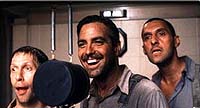O Brother, Where Art Thou?
 for some violence and language.
for some violence and language.
Reviewed by: Artie Megibben
CONTRIBUTOR
| Moral Rating: | Average |
| Moviemaking Quality: |
|
| Primary Audience: | Teen to Adult |
| Genre: | Drama Comedy |
| Length: | 1 hr. 42 min. |
| Year of Release: | 2000 |
| USA Release: |
| Featuring |
|---|
| Ed Gale, George Clooney, John Turturro, Tim Blake Nelson, Holly Hunter |
| Director |
|
Joel Coen |
| Producer |
| John Cameron, Eric Fellner, Tim Bevan, Ethan Coen, John Cameron, Eric Fellner |
| Distributor |
I have a problem with movies where everybody talks as if they were reading out of an old novel about a bunch of would-be colorful characters. They usually end up sounding silly.” Those are the opening lines to Roger Ebert’s 1987 review of the Joel and Ethan Coen’s “Raising Arizona”. Ebert follows up with this tidbit of film-makig wisdom: “Generally speaking, it’s best to have your characters speak in strong but unaffected English…”
Thank God, the Coen brothers never heeded the ol’ thumb guy’s advice. Since “Raising Arizona”, the Coen boys have entertained and bewildered critics and moviegoers alike with odd films that transcend both Oscar nods and box office plods. Since Ebert’s bleak star-and-a-half review lo these many years ago, Coen-inspired films have been a never-ending parade of dialects and dialogue both absurd and heartwarming. Swedish Midwestern Policewomen. Twangy Southwestern Furniture Salesmen. Laid-back West Coast dudes. Even fast-talking Muncie girls. Well, their latest film, “O Brother, Where Art Thou?”, is no exception—a delicious melange of southern-fried accents, over-the-top homilies and—you got it—totally “affected” English. (Sorry, Roger).
“O Brother, Where Art Thou?” is kind of a cockeyed collision of Homer’s “Odyssey” and a Flannery O'Connor short story.
 “A Perfect Storm”’s George Clooney plays Ulysses Everett McGill (Get it? Ulysses?) an escaped convict from a Mississippi chain gang. He is joined (at the hip) by two lovable dim wits played brilliantly by John Turturro (BARTON FINK) and Tim Blake Nelson. it’s like “Of Mice and Men” with two Lennys for the price of one. The trio begins their Odyssey in the Post-Depression South coming across colorful characters with every optical malady imaginable. After two wrong guesses as to who corresponds to the Odyssey’s Cyclops, John Goodman (“Big Lebowski”) enters the movie as a conniving, one-eyed Bible salesman. (The Sirens, thankfully, are much easier to identify.)
“A Perfect Storm”’s George Clooney plays Ulysses Everett McGill (Get it? Ulysses?) an escaped convict from a Mississippi chain gang. He is joined (at the hip) by two lovable dim wits played brilliantly by John Turturro (BARTON FINK) and Tim Blake Nelson. it’s like “Of Mice and Men” with two Lennys for the price of one. The trio begins their Odyssey in the Post-Depression South coming across colorful characters with every optical malady imaginable. After two wrong guesses as to who corresponds to the Odyssey’s Cyclops, John Goodman (“Big Lebowski”) enters the movie as a conniving, one-eyed Bible salesman. (The Sirens, thankfully, are much easier to identify.)
True to the Homerian epic, our Ulysses has a wife. However, this Penelope has not been nearly as faithful awaiting her husband’s return. As a matter of fact, the former Mrs. McGill, played by another Coen alum, Holly Hunter, has told her children that their ne’er do well father was hit by a train—it sounds nicer than Daddy’s in the slammer. Oh, and by the way, she is set to marry a “bona fide” suitor in just a matter of days.
In place of the Greek epic’s pantheon of gods, this Ulysses and his hapless companions come across various Bible-belt manifestations of the Christian Deity. Two of the escapees join a Baptist congregation “down by the riverside” and have their sins washed away. Of course, their faith wavers ever so slightly when Brother McGill explains that getting things squared away with the Lord doesn’t absolve you of your crimes against the Commonwealth of Mississsippi. Too bad. By the end of the film, even the slick, cynical McGill is on his knees asking the good Lord’s intervention.
This offbeat, artsy film maintains a striking cinematic look—amber waves of grain, amber autumnal foilage, amber campfire flames. Big on the amber. The film also boasts a mournful score of old southern bluegrass gospel numbers. By the way, my wife assures me that the Coens are not making fun of Christians in this film (That “laughing with you, not at you” thing.) But be forewarned, with plenty of violence, animal cruelty and down-home cussing, there is something in this film to offend pretty much everybody—cow and horn toad lovers if no one else.
All in all, however, “O Brother, Where Art Thou?” is a beautifully crafted, quirky film—perhaps the Coen’s oddest—and one of the few films this year than will speak of salvation, answered prayer, while using the Lord’s name in some way other than the proverbial curse word. And that, in this day and age, O brothers, is something just short of a miracle.


[Better than Average / 4]
[Better than Average / 5]
[Very Offensive / 1]
[Better than Average / 5]
[Excellent / 5]
[SLIGHTLY Objectionable / 5]
[SLIGHTLY Objectionable / 4½]
[SLIGHTLY Objectionable / 4½]
[SLIGHTLY Objectionable / 5]


My Ratings: [Average / 5]